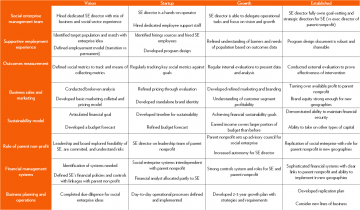
Social entrepreneurship is a type of entrepreneurship in which the main goal is to develop, fund and implement solutions to social, cultural, or environmental issues. Social entrepreneurship denomination can be applied to a wide range of organizations, which vary in size, aims, and beliefs. It includes community interest companies, benefit corporations and many other types of companies. In this guide in 4 parts we give an overview to this sector, including key concepts, history, various fascinating case studies and examples, and practical resources such as what alternative sources of funding serve social entreprise and how these companies can find ways of certification.
Introduction to Social Entrepreneurship – Part 2
As we have seen in part 1 of this guide, Social Entrepreneurship is the activity of establishing new business ventures to achieve social change. The business utilises creativity and innovation to bring social, financial, services, educational or other community benefits. It usually addresses complex social, economic, environmental challenges. A key element of a social enterprise is the entrepreneur, who is seen as a change maker. Social Entrepreneurs’ recognise social or environmental problems and use traditional entrepreneurial principles to solve them.
Case Study: Bridge International Academies

Bridge International Academies, is a famous social enterprise that has won various prizes. The company believes in ongoing teacher training and support, advanced lesson plans and the use of wireless technology to deliver education, anywhere it’s needed. They have been a participant in the United Nations Global Compact since September 2017. It is headquartered in Nairobi, Kenya with additional offices in Kampala, Lagos, Monrovia, Vijayawada, London, Boston, and Washington, DC.
This private network of schools began in Kenya in 2007 in 2008 and grew very quickly through the careful planning of Bridge’s CEO, a former Silicon Valley entrepreneur named Jay Kimmelman, who compares his company to Starbucks and McDonald’s — organizations that offer a consistent experience no matter where in the world you encounter them. .
In January of 2013, the company launched 51 schools at once, while in September it opened another 78. Bridge now educates roughly 50,000 students in Kenya every day, and its global aspirations are incredibly ambitious, has they aim to transform the entire project of education for poor youths around the world.
Bridge focused on giving opportunities to both boys and girls as unfortunately these still face many barriers. Empowering and supporting girls to succeed in the classroom and fulfil their potential in life is essential. Families, communities, and nations need educated girls to prosper and grow.

Through partnerships, Bridge is now also cooperating and supporting government schools and also run community schools. It supports over 1,000 (mainly public )schools and has educated half a million children in the last decade. It’s ambition plan is to educate 10,000,000 pupils across 12 or more countries by 2025. It currently operates schools in India, Kenya, Liberia, Nigeria, and Uganda.
Through the use of technology it streamlines school administration, delivers lessons plan to teachers, facilitates classroom management and tracks the progress of both teachers and students in real time. The company has notable investor support from Mark Zuckerberg and Bill Gates Foundation.
This work is done through a central team that prepares content and monitors student progress. Bridge equips its teachers with a tablet onto which they download daily lesson plans and teacher guides.
The central academic team reviews outcomes to iterate lessons in real time, or identify needs for further teacher training. The academic team additionally identifies new methods or resources they believe can aid learning and gathers data on results.
Bridge’s plan is to use this unprecedented data on learning to not only improve its model, but also to contribute to wider pedagogy.
Life cycle of Social Enterprise
What is the typical life-cycle of a social enterprise formation? How to scale and reach sustainability?


Part 3 will be posted tomorrow

Founder Dinis Guarda
IntelligentHQ Your New Business Network.
IntelligentHQ is a Business network and an expert source for finance, capital markets and intelligence for thousands of global business professionals, startups, and companies.
We exist at the point of intersection between technology, social media, finance and innovation.
IntelligentHQ leverages innovation and scale of social digital technology, analytics, news, and distribution to create an unparalleled, full digital medium and social business networks spectrum.
IntelligentHQ is working hard, to become a trusted, and indispensable source of business news and analytics, within financial services and its associated supply chains and ecosystems





























